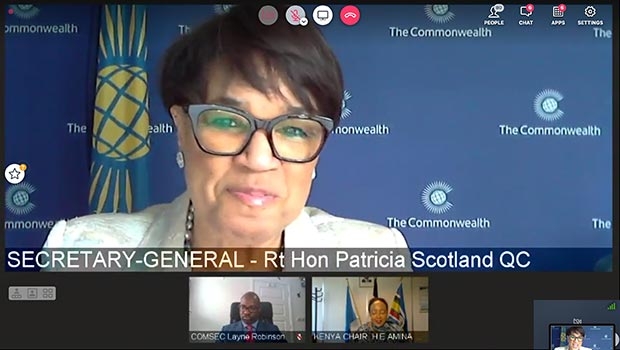
Commonwealth collaboration is vital to the recovery of the sport sector which has suffered a crushing blow from essential measures to stem the spread of COVID-19.
This was the recurring theme as sports ministers from Africa, Asia, the Caribbean, Europe and the Pacific met at a landmark forum on the impact of the pandemic on their sector.
COVID-19 impact on the sport sector
Countries spoke about the deep health and economic scars left by the closure of community sport, gyms and exercise facilities, the decimation of the local and international sporting calendar, and the loss of revenue from broadcasting and sponsorship deals.
According to a recent Commonwealth study, while the overall economy of the 54 member countries would contract on average by 3.2 per cent in 2020, the contribution of sport sectors to GDP could drop by well over 20 per cent in several states.
Commonwealth Secretary-General Patricia Scotland said: “Our countries are shouldering many very heavy burdens as a result of the pandemic.
“Among these, necessary restrictions affecting the sport sector make much of its future is uncertain and are preventing it from making its much needed contributions to physical wellbeing, mental health and economic activity.
“So it was really encouraging to see how Sports Ministers in our member countries are responding to the effects of COVID-19 with powerful and imaginative initiatives. Return-to-play toolkits, grants for community clubs and virtual programmes to help people of all ages to be physically active were among examples shared at the forum.
READ ALSO: 22nd JOMBA: Contemporary Dance Experience Goes Digital and Global in 2020
“What also came through loud and clear is that by continuing to work together our chances of success in overcoming the impacts of the pandemic are greater, and our recovery will be swifter and more sustainable.
“Building on existing cooperation and momentum already achieved, the Commonwealth Secretariat has launched a range of innovative projects and programmes, based on careful research and analysis, so that in all our member countries sport can be used more effectively to build communities that are socially and economically more resilient with healthier populations”
Commonwealth Moves
Resources such as the new Commonwealth Moves programme was shared with ministers to support efforts to get more people active while complying with the rules imposed to suppress the pandemic.
The online tool is tailored to tackle the ongoing ‘pandemic’ of immobility, exacerbated by COVID-19 disruptions. It includes activities for all demographics, including young people, the elderly and persons with disabilities.
Forum participants expressed strong support for the Secretariat’s initiatives. This includes its programme on measuring sport’s contribution to the sustainable development goals and its recent online course on designing effective policies and programmes.
Kenya’s Cabinet Secretary for Sports, Culture and Heritage, Amina Mohamed chaired the forum. She said: “This forum was timely and critical for many governments still working very hard to fight the devastating pandemic that ambushed the globe early this year.
“The forum confirmed an unmistakable desire among Commonwealth Sport Ministers to collaborate, share solutions and pool their collective knowledge aided by the Commonwealth Secretariat including a newly developed pool of resources, carefully crafted to support countries resuscitate sport sectors choked by COVID-19, and ensure that we re-build healthier, more resilient, inclusive and sustainable economies and populations.”
Responses to current challenges
Ministers at the forum presented how they are responding to the current challenges and planning the safe and staged return-to-sport. These range from guidelines for cross border competitions and provisions of economic support for grassroots clubs to investment in the e-sport sector and helplines to address abuse in sport.
In a statement released after the forum, sports ministers agreed that future policies, programmes and competitions should integrate delivery modifications and virus suppression measures, and that the sector should be a focus of recovery and rebuilding efforts.



























